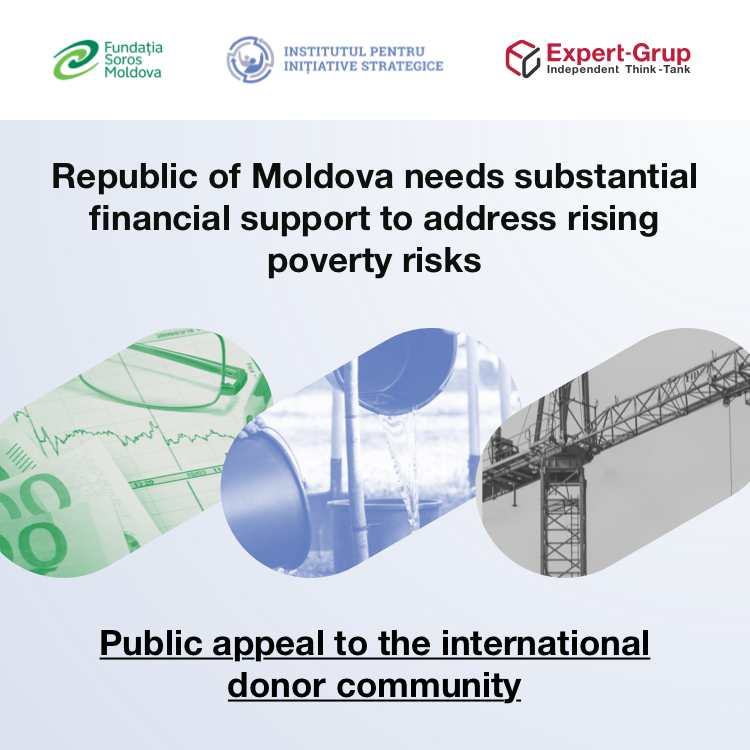„Republic of Moldova needs substantial financial support to address rising poverty risks”. Public appeal to the international community ahead of the donors’ conference in Bucharest

The Republic of Moldova is facing a perfect storm composed of rising energy and food prices, high inflationary expectations ahead of the winter season when gas prices reach maximum highs, war at the border that skyrocketed logistic costs, disrupted value-chains and induced huge uncertainty among firms, households and the government, along with draught and stagnation or even recession for this year. On the background of this difficult environment, the country received a clear European perspective in the form of EU candidate status as a sign of support and credit of trust from the European Union for a series of important reform commitments of the government that are yet to be delivered in such areas as justice, fight against corruption, public administration, state-owned enterprises, and macro-financial stability. Moldova also received important financial assistance from the IMF, EU, and other development partners and, as a result, the massive deficit of about 1 billion EUR planned for 2022 will be financed exclusively from external financial support.
Despite the increased support, Moldova is unprepared for the emerging two risks: the potential new inflationary wave caused by the draught and the upcoming seasonal increase in gas prices. There are increased signs that the draught this summer will undermine a substantial part of the agricultural output, leading to another wave of price spikes for foodstuffs. Moreover, the upcoming winter season could double or even triple the gas prices, generating another inflationary shock for the economy. This will be followed by further tightening of the monetary policy, putting additional burden on indebted firms and households (as most loans are issued at flexible exchange rates). For a country where one quarter of the population lives in absolute poverty and where foodstuffs and utilities represent about 60% of average expenditures per household, this upcoming inflationary wave will aggravate further the social repercussions, which will have to be mitigated by a targeted social assistance to help the most vulnerable. Even though the budgetary commitments for 2022 are being met so far, the financial coverage needed during the winter and the entire 2023 to address increased needs for social assistance amid this inflationary shock is not certain.
Five immediate priorities for external financial support for Moldova for alleviating poverty risks
1. A more direct budgetary support in the form of grants rather than loans. Moldova’s external public debt-to-GDP ratio remains one of the lowest in the region with about 38% planned for 2022. However, amid increased financing needs, the country’s indebtedness level will easily rise above 40% of GDP in the next few years and could approach the maximum sustainability threshold of 45% of GDP. In the context of tough economic conditions within the country and the entire region, this pattern of external financing could pose major difficulties in the near future. In this regard, it is worth mentioning that according to the latest data on budgetary execution for January-May 2022, the volume of external loans received was higher by 59%, whereas the volume of grants was lower by 26%, compared to the same period of the previous year. Therefore, it is necessary to revise the mechanisms of providing financial support to Moldova by putting more emphasis on grants rather than loans in order to ease the financial burden on the budget and ensure sufficient fiscal space for economic recovery.
2. Compensations of increased tariffs for natural gas for the most vulnerable. The upcoming winter season will drive up again the import prices for natural gas that will call for the Government to step in to protect the households that are close or below the poverty line. Depending on the import prices, about 500 million EUR will be necessary in order to provide on-bill compensations, which are not covered by the budget. That will mitigate the poverty risks and will support the budget and the entire economy during this crisis because these transfers will be used immediately for households’ consumption turning in budgetary receipts from VAT and excises. Moreover, additional financial support is needed to support Moldova procure natural gas and electricity from alternative sources in order to set the grounds for the long-term diversification of energy imports.
3.Compensations of increased interest rates for mortgage loans under “Prima Casa” program. The “Prima Casa” program was designed primarily for young families that faced difficulties in obtaining mortgage loans from banks under commercial conditions, by providing a substantial state guarantee. Although it allowed banks to provide such loans at attractive conditions, the interest rates were tied to the central banks’ policy rate. Given the rising inflation and tightening of the monetary policy, the interest rates for these loans started to increase as well, fueling the default risks for many vulnerable debtors. The government is committed to compensate a part of these increase in interest rates, which will require a budgetary coverage of about 10-12 million EUR for a duration of 12 months.
4.Compensations for increased costs of fertilizers. The prices of fertilizers increased significantly on the grounds of disruption of logistical chains because of the war in Ukraine, rising gas and food prices. It put a significant pressure on the farmers, the small ones, undermining future agricultural outputs, driving food prices even higher and fueling the risks of food security crisis. Hence, it is necessary to compensate a part of these costs for farmers and avoid another crisis, which will require about 15 million EUR.
5. Financial incentives to enhance energy efficiency in the residential sector. Besides monetary poverty, the Moldovan society faces the problem of high energy poverty, as the share of energy bills in total households’ expenditures is one of the highest in the region. At the same time, besides the tariffs, a major vulnerability lies in exceptionally low energy efficiency of most residential buildings (primarily, Soviet style story apartment blocks). In the medium and long-term perspective, these houses must be modernized with the entire heating system replaced. But in the immediate term perspective, it is necessary at least to ensure a proper thermic isolation of walls, windows, and roofs. These are most obvious immediate quick wins that will mitigate the tariff shock on the households’ budgets in this upcoming winter season, which will require about 50 million EUR investments.
In conclusion, Moldova needs major financial support from its development partners to overcome the immediate unprecedented mix of crises, mitigate the poverty risks, and concentrate on accelerated Europeanization agenda. In this regard, ahead of the donors’ conference in Bucharest planned for July 15, we make an appeal to the international community to continue supporting the country, with a special emphasis on helping the most vulnerable households, as rising poverty is the most important challenge for the country’s economic, social, and political prosperity.
DOWNLOAD HERE:Public_appeal_to_international_donor_community_2



 Română
Română English
English